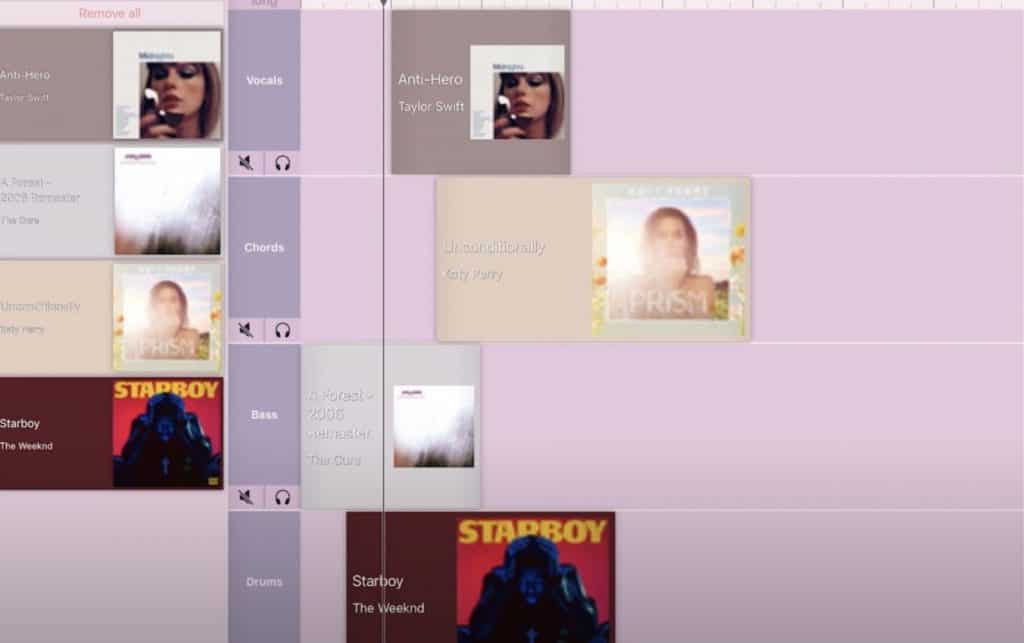AI App Mixboard Allows Users to Create Unique Musical Mashups by Blending Artists and Genres Seamlessly


In Brief
Mixboard has the potential to democratize music creation by eliminating the barrier of formal musical education and making it accessible to individuals with varying levels of musical expertise.
Researchers at the Georgia Institute of Technology in the United States have unveiled an AI-powered application that enables users to effortlessly blend the music of their favorite artists. Developed under the name Mixboard, this innovative iOS program is designed to empower individuals without formal musical education to create their own personalized tracks.

Mixboard promises to revolutionize the music creation process by providing a user-friendly interface that allows users to select up to four tracks from their Spotify or Mixboard library for a mashup. The application intelligently categorizes the selected songs into vocals, bass, drums, and chords, enabling the AI algorithm to determine which parts to extract from each track.
The advanced algorithm incorporated within Mixboard autonomously selects the desired tempo and key for the mashup. It further edits individual samples to seamlessly combine them into a cohesive musical composition. The Mixboard AI has been meticulously trained on open-source music libraries, enabling it to accurately identify and manipulate audio elements with precision.

Mixboard has yet to be released to the public, primarily due to copyright concerns. The developers are working diligently to address these legal complexities to ensure a smooth and compliant launch. Copyright issues in the realm of music pose unique challenges, particularly when blending tracks from established artists and record labels. The developers are actively engaged in negotiations and discussions to secure the necessary permissions and licenses to make Mixboard available to the wider public.
The AI app enables users to focus on developing the song instead of worrying about technical aspects and music theory. The potential of Mixboard to democratize music creation is immense. By eliminating the barrier of formal musical education, the application opens up a world of possibilities for aspiring musicians, enthusiasts, and even casual listeners to experiment with their favorite tracks. The intuitive interface and AI-powered algorithms make it accessible to individuals with varying levels of musical expertise. The app uses open-source music information retrieval libraries to determine song tempo, keys, and music stems, and provides templates of basic song structures to help users create an appealing track.
To ensure Mixboard was functional, the researchers conducted user surveys with 45 subjects between the ages 18 and 27, excluding anyone with more than a year of music mixing or composition experience. Qinying Lei, a music technology master’s graduate, said Mixboard evokes a range of emotions in him, including pride, nervousness, and excitement.
The future of Mixboard is unknown, but the researchers hope it will help users create unique and new tracks.
The researchers at Mixboard are looking to commercialize the app, but are limited by licensing constraints. They have consulted with Kobi Abayomi, former senior vice president for Data Science at Warner Music Group, and Nitin Hugar, a music technology master’s graduate. Nitin Hugar said that listening to the generated mashups getting better with each modification to the algorithm was amazing. He also appreciated how music from different regions of the world are interconnected.
Read more about AI:
Disclaimer
In line with the Trust Project guidelines, please note that the information provided on this page is not intended to be and should not be interpreted as legal, tax, investment, financial, or any other form of advice. It is important to only invest what you can afford to lose and to seek independent financial advice if you have any doubts. For further information, we suggest referring to the terms and conditions as well as the help and support pages provided by the issuer or advertiser. MetaversePost is committed to accurate, unbiased reporting, but market conditions are subject to change without notice.
About The Author
Damir is the team leader, product manager, and editor at Metaverse Post, covering topics such as AI/ML, AGI, LLMs, Metaverse, and Web3-related fields. His articles attract a massive audience of over a million users every month. He appears to be an expert with 10 years of experience in SEO and digital marketing. Damir has been mentioned in Mashable, Wired, Cointelegraph, The New Yorker, Inside.com, Entrepreneur, BeInCrypto, and other publications. He travels between the UAE, Turkey, Russia, and the CIS as a digital nomad. Damir earned a bachelor's degree in physics, which he believes has given him the critical thinking skills needed to be successful in the ever-changing landscape of the internet.
More articles

Damir is the team leader, product manager, and editor at Metaverse Post, covering topics such as AI/ML, AGI, LLMs, Metaverse, and Web3-related fields. His articles attract a massive audience of over a million users every month. He appears to be an expert with 10 years of experience in SEO and digital marketing. Damir has been mentioned in Mashable, Wired, Cointelegraph, The New Yorker, Inside.com, Entrepreneur, BeInCrypto, and other publications. He travels between the UAE, Turkey, Russia, and the CIS as a digital nomad. Damir earned a bachelor's degree in physics, which he believes has given him the critical thinking skills needed to be successful in the ever-changing landscape of the internet.



















































